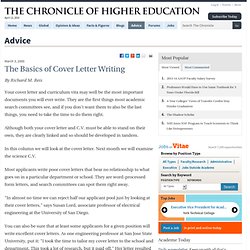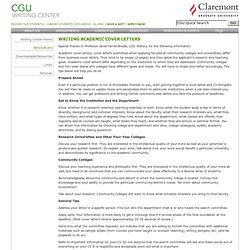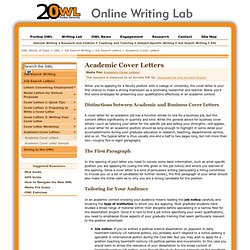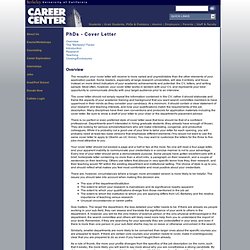

The Basics of Cover Letter Writing - Advice. By Richard M.

Reis Your cover letter and curriculum vita may well be the most important documents you will ever write. They are the first things most academic search committees see, and if you don't want them to also be the last things, you need to take the time to do them right. Although both your cover letter and C.V. must be able to stand on their own, they are clearly linked and so should be developed in tandem. In this column we will look at the cover letter. Most applicants write poor cover letters that bear no relationship to what goes on in a particular department or school. "In almost no time we can reject half our applicant pool just by looking at their cover letters," says Susan Lord, associate professor of electrical engineering at the University of San Diego.
You can also be sure that at least some applicants for a given position will write excellent cover letters. Let's take a look at how one successful candidate (the author mentioned above) approached her cover letter. CVCoverLetters.pdf (application/pdf Object) Writing Academic Cover Letters. Special thanks to Professor Janet Farrell Brodie, CGU History, for the following information.

Academic cover letters, cover letters submitted when applying for jobs at community colleges and universities, differ from business cover letters. They tend to be longer (2 pages) and they detail the applicant’s research and teaching goals. Academic cover letters differ depending on the institution to which they are addressed. Community colleges and four-year liberal arts colleges have different goals and needs. You will have to shape your letter accordingly. Prepare Ahead Even if a particular position is not of immediate interest to you, start putting together a cover letter and CV template. Get to Know the Institution and the Department Know whether it is research-oriented, teaching-oriented, or both. Research Universities and Other Four-Year Colleges Discuss your research first. Community Colleges Discuss your teaching experience and philosophy first.
Talk about your research. General Tips. Academic Cover Letters. When you're applying for a faculty position with a college or university, the cover letter is your first chance to make a strong impression as a promising researcher and teacher.

Below you'll find some strategies for presenting your qualifications effectively in an academic context. Distinctions between Academic and Business Cover Letters A cover letter for an academic job has a function similar to one for a business job, but the content differs significantly in quantity and kind. While the general advice for business cover letters—such as tailoring your letter for the specific job and selling your strengths—still applies, a cover letter for an academic position should be long enough to highlight in some detail your accomplishments during your graduate education in research, teaching, departmental service, and so on.
The typical letter is thus usually one and a half to two pages long, but not more than two—roughly five to eight paragraphs. The First Paragraph. AcCoverLetters.pdf (application/pdf Object) PhDs - Cover Letter. Overview The reception your cover letter will receive is more varied and unpredictable than the other elements of your application packet.

Some readers, especially at large research universities, will skip it entirely, and focus instead on more direct indicators of your academic achievements and potential: the CV, letters, and writing sample. Most often, however, your cover letter works in tandem with your CV, and represents your best opportunity to communicate directly with your target audience prior to an interview. The cover letter should not simply repeat the information contained in the CV; rather it should elaborate and frame the aspects of your academic training and background that you want search committee members to have uppermost in their minds as they consider your candidacy. At a minimum, it should contain a clear statement of your research and teaching interests, and how your qualifications match the requirements of the job description.
The "Berkeley" Factor Introduction.